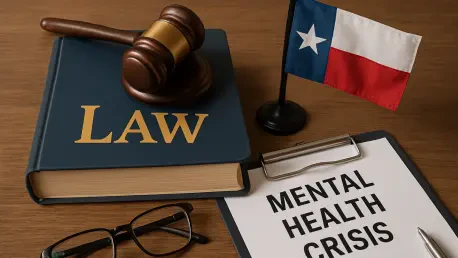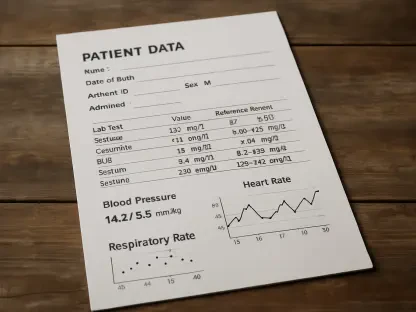In the heart of Texas, a pressing public health challenge unfolds daily as individuals grappling with severe mental illness often slip through the cracks of a strained system, sometimes with tragic consequences, prompting urgent calls for reform. A new piece of legislation, Senate Bill 1164, has emerged as a potential lifeline, aiming to transform how law enforcement responds to mental health crises by lowering the threshold for intervention. This law allows officers to detain individuals believed to be suffering from a mental condition they cannot recognize—a state known as anosognosia—even if they do not pose an immediate threat. With personal stories of loss and recovery fueling its support, alongside concerns about misuse, this policy shift sparks a vital conversation about balancing public safety with individual rights. As Texas grapples with limited mental health resources, the question looms: can this legislative change truly prevent crises from escalating to fatal outcomes, or does it risk overreach in an already complex landscape?
Addressing a Critical Gap in Crisis Response
The introduction of Senate Bill 1164 marks a significant departure from previous Texas policies that required an imminent danger before law enforcement could intervene in mental health crises. Under the old standard, many individuals remained untreated until their conditions spiraled into dangerous situations, often resulting in arrests or worse. The new law shifts the focus to early intervention, empowering officers to act when they believe someone is unable to recognize their own mental illness. Advocates argue this addresses a critical gap, as conditions like anosognosia prevent individuals from seeking help voluntarily. Personal accounts, such as that of Eric Smith, a mental health advocate and state commissioner, underscore the urgency of this change. Smith’s own experience with unmanaged psychosis highlights how intervention could have altered his path sooner, preventing a cycle of crisis and arrest. This legislation, therefore, is seen by many as a proactive step toward saving lives by catching issues before they escalate to irreversible harm.
Beyond the personal narratives, the broader societal impact of this law cannot be overlooked. Texas has long struggled with a shortage of mental health resources, often leaving law enforcement as the first point of contact during crises. Senate Bill 1164 aims to equip officers with clearer guidelines to act decisively, a move supported by figures like Ted Isensee, who lost his son to a police shooting during a mental health episode. Through his foundation, Isensee pushes for better de-escalation training alongside legislative reform, viewing the law as a framework for safer interactions. However, the shift also raises questions about whether early intervention might blur the line between help and coercion. While the intent is to protect, the potential for misjudgment in identifying mental illness looms large. This duality reflects a growing recognition that mental health crises are not just personal struggles but public safety issues requiring nuanced solutions beyond traditional policing methods.
Navigating the Risks of Misuse and Overreach
While Senate Bill 1164 is hailed by many as a progressive measure, it is not without its detractors who caution against potential misuse. Houston City Council Member Tiffany Thomas has voiced concerns that the law could disproportionately target vulnerable populations, such as the unhoused, under the pretext of mental health intervention. The broadened authority for police to detain individuals based on perceived mental illness opens the door to subjective interpretations, which could lead to civil rights violations if not carefully monitored. Critics argue that without robust oversight and clear criteria, the law risks becoming a tool for control rather than care. This perspective emphasizes the need for checks and balances to ensure that intervention remains rooted in genuine concern for well-being rather than convenience or bias. The challenge lies in distinguishing between those who truly need help and those who may be unfairly labeled as mentally ill due to societal stereotypes or misunderstandings.
Adding to the complexity is the reality of Texas’s strained mental health infrastructure, which complicates the law’s implementation. Even with the best intentions, detaining individuals under this new policy is only a first step; access to treatment remains a significant hurdle. The state ranks poorly in mental health bed availability, meaning that many who are detained may not receive the follow-up care they need, potentially cycling back into crisis. Advocates stress that the law must be paired with increased funding for mental health services and training for law enforcement to handle such sensitive situations ethically. Organizations like the National Alliance on Mental Illness (NAMI) Greater Houston highlight the importance of community education to complement legal measures. Without systemic support, the risk of misuse grows, as officers may lack the resources or expertise to connect individuals with appropriate care. This underscores a critical tension: while the law offers a tool for intervention, its success hinges on a foundation that Texas is still struggling to build.
Building a Path Forward with Systemic Support
Looking back, the enactment of Senate Bill 1164 represented a pivotal moment in Texas’s approach to mental health crises, driven by heartfelt stories of loss and recovery from advocates like Eric Smith and Ted Isensee. Their experiences painted a stark picture of the gaps in the previous system, where waiting for imminent danger often proved too late. The law’s focus on early intervention through recognizing conditions like anosognosia sought to prevent such tragedies, reflecting a broader societal shift toward viewing mental illness as a public safety concern. Yet, the concerns raised by figures like Tiffany Thomas about potential overreach served as a reminder of the delicate balance between protection and personal freedom. Implementation challenges, from training to resource allocation, further highlighted the complexities of translating policy into practice. These diverse perspectives shaped a narrative of cautious hope, acknowledging the law’s potential while recognizing its limitations without systemic backing.
Reflecting on the journey, the next steps for Texas involved a multifaceted commitment to bolster the impact of this legislation. Policymakers were urged to prioritize funding for mental health facilities to ensure that intervention led to treatment rather than mere detention. Enhanced training programs for law enforcement emerged as a critical need, equipping officers with the skills to de-escalate crises and identify genuine mental health issues accurately. Collaboration with medical professionals and judicial oversight became essential to safeguard civil liberties, preventing the law from being misused against vulnerable groups. Community initiatives, supported by organizations like NAMI, aimed to raise awareness and reduce stigma, fostering an environment where seeking help was encouraged long before a crisis point. These actionable measures pointed to a future where mental health response could be both proactive and compassionate, provided the state invested in a holistic framework to support Senate Bill 1164’s ambitious goals.









